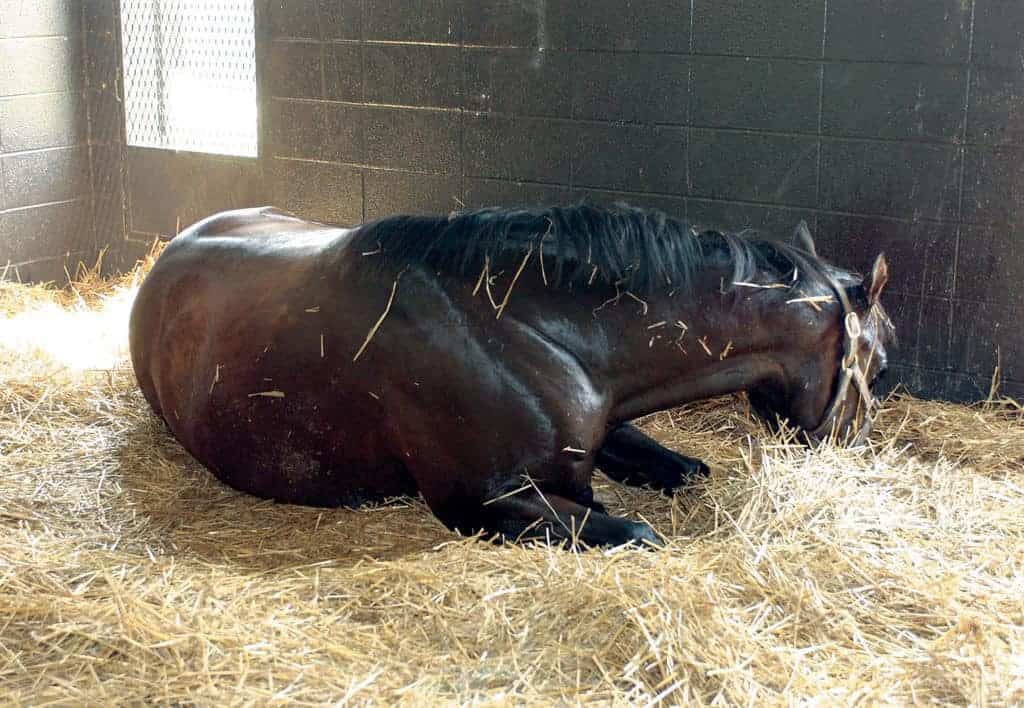
Common Colic Questions
All about equine colic, from when to call the vet to how well horses recover from surgery.

All about equine colic, from when to call the vet to how well horses recover from surgery.
Scientists have established the link between cribbing (also called windsucking) and colic, but a “causal” relationship between the two remains to be proven, say researchers from the University of California, Davis.
Unlike heart and respiratory rates, abdominal sounds do not punch a specific time clock for generating “gut sounds.” The rhythmic peristaltic churning of food mixed with fluids within the gut varies in slower waves depending on meal time, the meal itself, and the level of activity. You don’t actually “time” bowel sounds, but you do want to know if they are present.
Champion Thoroughbred racehorse Speightstown had colic surgery April 1, and WinStar Farm, where the stallion stands, reported April 2 he’s “recovering well” after successful surgery.
Speightstown has covered more

When stalling your horse, consider the long-term effects this might have on general health and emotional state.
Expression of a particular protein in fat tissue is positively associated with an increased rate of postoperative mortality in horses, researchers recently reported. The research was led by Melissa Packer, BVetMed, MRCVS, who recently

Updates on preparing for colic, enteroliths, tapeworm colic, and cortisol hormone levels in colicky horses, from the 2009 convention of the American Association of Equine Practitioners.
Colic in horses simply refers to abdominal pain, which has many causes, and the prognosis (chance of a positive outcome) can vary remarkably depending on the underlying cause. This article will help you understand colic basics and treatment advances.
What was the hottest news in equine veterinary medicine in 2009? During the popular Kester News Hour session at the annual American Association of Equine Practitioners (AAEP) Convention, three top veterinarians (who focus on equine reproduction
Almost all horses with colic can be saved if the problem is recognized quickly and treatment is instituted rapidly, said Anthony Blikslager, DVM, PhD, Dipl. ACVS, of North Carolina State University, during the “In-Depth: Colic” portio
Colic is a general term indicating abdominal pain. The anatomy of the horse’s digestive tract, how the tract works, and the management practices imposed by man seem to contribute to colic’s occurrence.

Dr. Anthony Blikslager of the North Carolina State University talks about colic in horses. (7:39)
If your horse is at risk for intestinal stones or enteroliths (a common cause of obstruction-induced colic in horses), consider replacing an alfalfa-based diet with grass hay, said Diana M. Hassel, DVM, PhD, of Colorado State University.
Developed by a team at Utah State University, a proposed equine distress monitor system combines a tilt sensor, accelerometer, and wireless technology interfaced with a computer in order to alert horse owners to animals in distress. The tea
Please turn on your imagination for
In this first-of-its-kind, live question and answer session, horse owners were able to ask three veterinary specialists from The Ohio State University about colic, which is second only to old age as the leading cause of horse deaths each year.
Stay on top of the most recent Horse Health news with
"*" indicates required fields